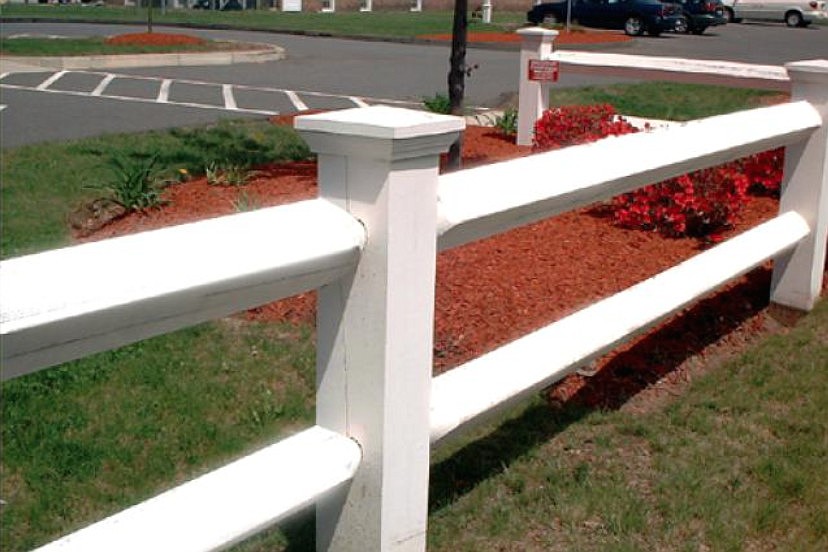- February 24, 2025

Palm Coast may allow open fences like split-rails in front yards, and require new solid fences in back yards to have step-downs to four feet within 20 feet of a saltwater canal.
Under a proposal explained to the City Council by staff at a March 31 workshop, fences would be allowed only along the side setback, and could not enclose the yard.
They would have to be at least 50% open, set back at least five feet from the front property line, and be three feet or less in height, according to the proposal drafted by the city’s planning and land development staff.
Chain-link fences would not be allowed. The proposal would also clarify the city code to explicitly allow small, decorative fences around landscaping features.
“Does it make everybody happy? No, but it seems to be a reasonable compromise,” Mayor Jon Netts said after the staff presentation.
City Councilman Steven Nobile said that three feet might be so low that residents would have trouble finding fences short enough to comply with the rule.
“It was hard to find a three-foot fence of significance,” he said. “It just didn’t seem feasible; it just seemed too low.”
Nobile said even the fences shown in a PowerPoint presentation on the proposal looked like they were over three feet tall.
Staff will reconsider the height restriction before drafting language for a change that would come before the City Council for approval at a business meeting.
City plans user-friendly utility billing system
When a Palm Coast resident pays their city utility bill online, logs out, then logs back in days or weeks later, the current city billing site will show the bill as unpaid until the next billing cycle begins.
“So you’ll have people pay, and they’ll go online a week later and they didn’t get credit,” City Manager Jim Landon said at the March 31 City Council workshop. “And then they may try again,” or call staff members and yell at them.
It’s one symptom of what Landon called a “very antiquated” billing system the city hopes to replace with a move to a new billing firm that would feature real-time updates after a user pays, as well as the ability to pay through mobile devices.
The city now uses multiple vendors for its billing system, and the costs add up to an average of $44,600 per month between merchant services, postage, the company that prints the paper bills and other expenses.
The firm selected by staff as the city’s top pick out of seven responses to a city RFP — Paymentus — would handle all aspects of utility billing for an expected average cost of $43,500 per month.
The City Council will vote on whether to award the contract for the job to Paymentus at a future business meeting.
The city hopes to roll out the new billing system by July.
Code enforcement process lengthy, state-mandated
Councilwoman Heidi Shipley said in her comments at the end of the City Council meeting that a recent Palm Coast Observer story on code enforcement prompted residents to send her emails.
“They’re asking me to look at code enforcement, to see what they do when they’re driving around, why they’re driving around, why some people’s houses are tagged and others aren’t,” she said.
She asked to go on a ride along, so she could better explain the process to constituents.
Landon said she could, and pointed out that residents who call in complaints and then accuse the city of not doing anything often aren’t aware of what’s going on behind the scenes.
“It takes two weeks, and maybe even longer if the people don’t cooperate, and they’re thinking we haven’t done anything,” he said.
As to complaints of uneven enforcement, Landon said, “Our policy is that if someone calls in for trash cans left out on non-trash days, and then they go into that neighborhood, they will actually issue a notice or a warning to everyone who has a trash can out. We don’t go down the street with blinders on and just go to that one street that somebody complained about.”
City Attorney Bill Reischmann said the city’s process for taking a violation from an initial warning to a Code Board hearing is the same as other Florida cities.’
“The City of Palm Coast Code Enforcement, from a procedural standpoint, is done identically to any other city, any other county in the state of Florida, because it’s statutorily mandated,” he said.
Netts said that can frustrate people who report a violation for something like an unruly lawn only to wait months for the situation to change, while the resident issued the warning is given repeated, state-mandated time periods in which to comply as the grass keeps growing.
“We’re complying with the process that the state set forth,” Netts said. “It is not one that gives you quick, instantaneous relief.”